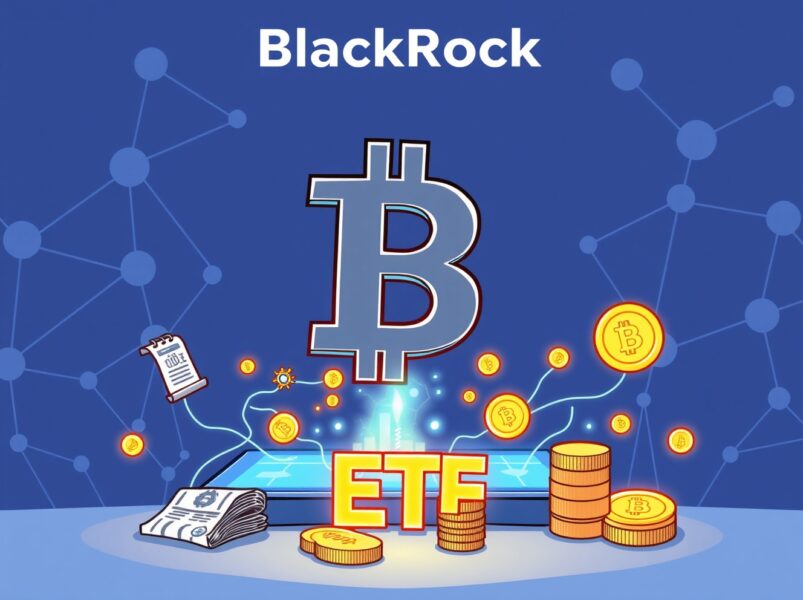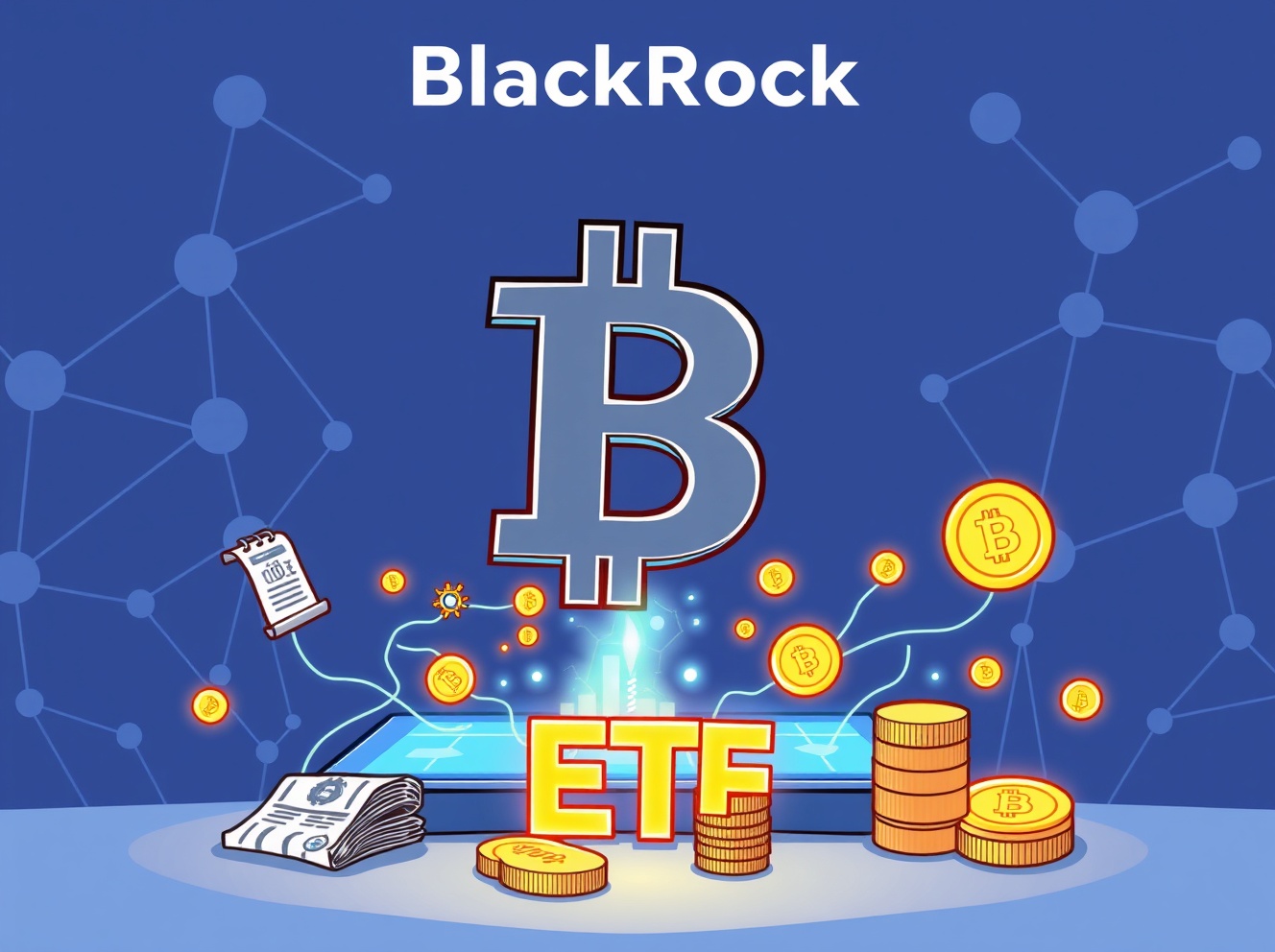Pioneering Tokenized ETFs: BlackRock’s Next Digital Frontier
0
0

BitcoinWorld

Pioneering Tokenized ETFs: BlackRock’s Next Digital Frontier
Imagine a world where investing in a diverse portfolio is as simple as buying a fraction of a digital token. This vision is rapidly becoming a reality, especially with financial giants like BlackRock stepping into the digital asset space. Following the remarkable success of its spot Bitcoin ETF, BlackRock is now reportedly setting its sights on a groundbreaking new frontier: tokenized ETFs. This move signals a significant shift, promising to reshape how we think about traditional investments.
What Exactly Are Tokenized ETFs and Why Are They Important Now?
At its core, a tokenized ETF represents ownership of a traditional exchange-traded fund, but in a digital, blockchain-based format. Think of it as taking the shares of an ETF and turning them into digital tokens that live on a blockchain. This innovation allows for the benefits of traditional ETFs, such as diversification and professional management, to merge with the efficiencies of blockchain technology.
The timing for BlackRock’s exploration of tokenized ETFs is no coincidence. The firm’s successful foray into the spot Bitcoin ETF market has clearly demonstrated the immense demand and operational viability of integrating digital assets into mainstream finance. This experience has likely provided BlackRock with valuable insights and confidence to expand its digital asset strategy.
Unlocking New Opportunities: The Advantages of Tokenized ETFs for Investors
The concept of tokenized ETFs brings several compelling advantages to the table for investors. These benefits could fundamentally change how people access and manage their investments.
- Enhanced Liquidity: Tokenization can make assets more liquid. Investors might be able to trade fractions of ETFs 24/7 on various digital platforms, rather than being limited to traditional market hours.
- Fractional Ownership: Imagine owning a tiny piece of a high-value ETF. Tokenization makes this possible, lowering the barrier to entry for smaller investors who wish to diversify their portfolios without needing to purchase full shares.
- Increased Transparency: Blockchain’s inherent transparency means that ownership records and transaction histories are immutable and verifiable. This can build greater trust and reduce the potential for fraud.
- Reduced Costs: By streamlining processes and potentially cutting out intermediaries, tokenized ETFs could lead to lower transaction fees and administrative costs over time.
These advantages could democratize access to sophisticated investment products, making them available to a broader audience globally.
Navigating the Path to Tokenized ETFs: Challenges and Opportunities
While the potential for tokenized ETFs is immense, the journey ahead is not without its challenges. Implementing such a significant shift requires careful consideration of various factors.
- Regulatory Landscape: The regulatory environment for digital assets is still evolving. BlackRock will need to navigate complex legal frameworks across different jurisdictions to ensure compliance and investor protection.
- Technological Integration: Integrating blockchain technology with existing financial infrastructure is a complex undertaking. Ensuring security, scalability, and interoperability will be crucial for the success of tokenized ETFs.
- Market Adoption: Educating investors and financial advisors about the benefits and mechanics of tokenized products will be essential for widespread adoption. Building trust in this new paradigm takes time and effort.
Despite these hurdles, the opportunities are substantial. BlackRock, with its vast resources and influence, is uniquely positioned to overcome these challenges and set new industry standards.
BlackRock’s Vision: What Does This Mean for the Future of Finance?
BlackRock’s reported plans to tokenize its ETFs represent more than just a new product offering; it signifies a strategic embrace of digital transformation within traditional finance. This move suggests a belief that blockchain technology is not just for cryptocurrencies, but can fundamentally enhance and modernize conventional investment vehicles.
The firm’s influence is undeniable. When BlackRock, the world’s largest asset manager, makes a move like this, it often encourages other major financial institutions to follow suit. This could accelerate the mainstream adoption of digital assets and blockchain technology across the entire financial ecosystem. The future of investing might soon be defined by the accessibility and efficiency that tokenized ETFs promise to deliver.
The Digital Horizon is Here
BlackRock’s reported ambition to tokenize its ETFs marks a pivotal moment in the convergence of traditional finance and digital assets. By leveraging the lessons learned from its successful spot Bitcoin ETF, the asset management giant is poised to unlock new levels of liquidity, transparency, and accessibility for investors worldwide. While regulatory and technological challenges remain, BlackRock’s pioneering spirit could pave the way for a more inclusive and efficient investment landscape. The era of digital ownership for conventional assets is not just on the horizon; it is actively being built.
Frequently Asked Questions (FAQs)
1. What is the main difference between a traditional ETF and a tokenized ETF?
A traditional ETF is a fund that trades on stock exchanges, representing a basket of assets. A tokenized ETF represents ownership of that same basket of assets but as a digital token on a blockchain, offering potential benefits like fractional ownership, 24/7 trading, and enhanced transparency.
2. Why is BlackRock interested in tokenizing its ETFs?
BlackRock’s interest stems from the success of its spot Bitcoin ETF, which demonstrated the viability of digital assets. Tokenization offers potential for increased liquidity, reduced costs, and broader investor access to their funds, aligning with their goal of innovation.
3. Will tokenized ETFs be regulated?
Yes, any investment product offered by a major institution like BlackRock, especially in the US, would be subject to existing financial regulations. However, the specific regulatory framework for blockchain-based securities is still developing and may involve new interpretations or guidelines.
4. How will tokenized ETFs benefit average investors?
Average investors could benefit from lower investment minimums through fractional ownership, potentially lower trading fees, and greater accessibility to a wider range of investment products. The 24/7 trading aspect could also offer more flexibility.
5. Is this a replacement for traditional ETFs?
It is more likely to be an evolution or an alternative rather than a complete replacement. Tokenized ETFs could exist alongside traditional ETFs, offering investors more choices based on their preferences for digital asset integration and blockchain-specific benefits.
Did you find this article insightful? Share it with your network and help spread the word about the exciting future of tokenized ETFs and digital finance!
To learn more about the latest crypto market trends, explore our article on key developments shaping institutional adoption.
This post Pioneering Tokenized ETFs: BlackRock’s Next Digital Frontier first appeared on BitcoinWorld and is written by Editorial Team
0
0
 Manage all your crypto, NFT and DeFi from one place
Manage all your crypto, NFT and DeFi from one placeSecurely connect the portfolio you’re using to start.





